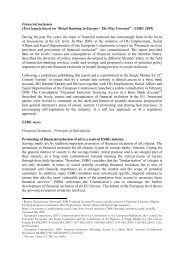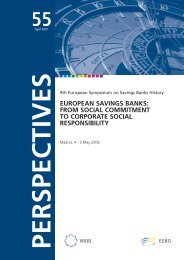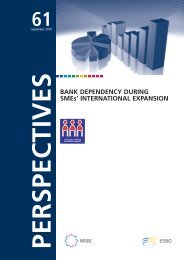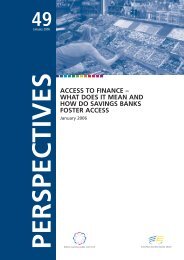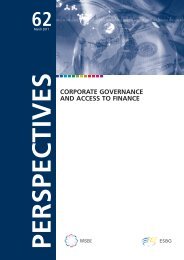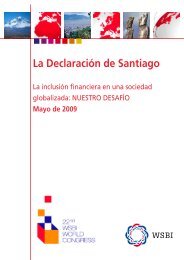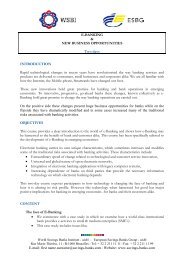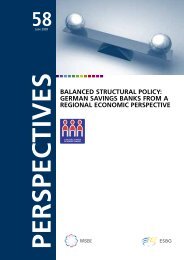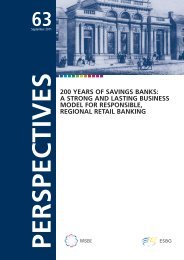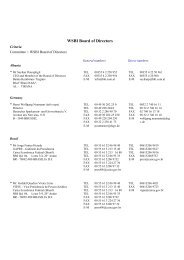A comparative analysis of the US and EU retail banking markets - Wsbi
A comparative analysis of the US and EU retail banking markets - Wsbi
A comparative analysis of the US and EU retail banking markets - Wsbi
You also want an ePaper? Increase the reach of your titles
YUMPU automatically turns print PDFs into web optimized ePapers that Google loves.
- As far as fees are concerned, <strong>the</strong> OCC has an<br />
extensive fee schedule for transactions, such as<br />
mergers <strong>and</strong> branch applications. In contrast, <strong>the</strong><br />
State <strong>banking</strong> departments in charge <strong>of</strong> <strong>banking</strong><br />
supervision generally charge filing fees on fewer<br />
types <strong>of</strong> transactions, <strong>and</strong> in those instances<br />
where <strong>the</strong>y do charge, those fees tend to be less<br />
than those <strong>of</strong> <strong>the</strong> OCC 168 .<br />
4.2.3.2 Europe<br />
4.2.3.2.1 <strong>EU</strong> level<br />
The ‘taking up <strong>and</strong> pursuit’ <strong>of</strong> <strong>the</strong> business <strong>of</strong> credit<br />
institutions is dealt with in <strong>the</strong> <strong>EU</strong> by Directive<br />
2000/12/EC. Contrary to <strong>the</strong> situation in <strong>the</strong> United<br />
States, <strong>the</strong> granting <strong>of</strong> an authorisation to do business<br />
to a credit institution is <strong>the</strong> exclusive responsibility <strong>of</strong><br />
<strong>the</strong> Member States. However, while <strong>the</strong> authorisations<br />
are granted by <strong>the</strong> individual Member States, <strong>the</strong><br />
conditions under which an authorisation can be<br />
granted are increasingly defined at <strong>the</strong> <strong>EU</strong> level <strong>and</strong><br />
applicable throughout <strong>the</strong> <strong>EU</strong>.<br />
This evolution is intrinsically linked with <strong>the</strong> decision<br />
to introduce <strong>the</strong> principle <strong>of</strong> <strong>the</strong> single passport, which<br />
means that with a licence granted by one Member<br />
State, a financial institution (e.g. credit institution or<br />
insurance undertaking) can provide services or open a<br />
branch in ano<strong>the</strong>r Member State 169 . The single passport<br />
system is indeed based on three key principles:<br />
harmonisation <strong>of</strong> <strong>the</strong> key aspects at <strong>the</strong> <strong>EU</strong> level<br />
(“minimum harmonisation”), prudential supervision<br />
performed by <strong>the</strong> home Member State <strong>and</strong> mutual<br />
recognition (<strong>of</strong> <strong>the</strong> authorisation <strong>and</strong> <strong>of</strong> <strong>the</strong> prudential<br />
supervision performed by <strong>the</strong> home Member State).<br />
These three elements are considered as <strong>the</strong> building<br />
blocks for <strong>the</strong> achievement <strong>of</strong> <strong>the</strong> internal market.<br />
The minimum requirements specified at <strong>EU</strong> level with<br />
respect to <strong>the</strong> taking up <strong>and</strong> pursuit <strong>of</strong> <strong>the</strong> business<br />
<strong>of</strong> credit institutions cover issues such as requirements<br />
in terms <strong>of</strong> own funds (including <strong>the</strong> existence <strong>of</strong><br />
an initial capital <strong>of</strong> at least €5 million) <strong>and</strong> specific<br />
conditions regarding <strong>the</strong> management body, <strong>the</strong><br />
shareholders <strong>and</strong> members 170 .<br />
The three principles <strong>of</strong> minimum harmonisation,<br />
home country supervision <strong>and</strong> mutual recognition<br />
have been applied in <strong>the</strong> different financial sectors.<br />
This has resulted in <strong>the</strong> creation <strong>of</strong> a single passport<br />
for UCITS (Undertakings for Collective Investment in<br />
Transferable Securities) 171 , for investment firms 172 , for<br />
insurance undertakings <strong>and</strong> more recently for<br />
regulated <strong>markets</strong> 173 .<br />
4.2.3.2.2 Member State level<br />
As stated above, authorisations to do business are<br />
granted by <strong>the</strong> individual Member States, <strong>and</strong> this<br />
is <strong>the</strong> case for all types <strong>of</strong> financial institutions.<br />
The competent authorities <strong>of</strong> <strong>the</strong> Member States<br />
may also withdraw an authorisation, in particular<br />
when <strong>the</strong> minimum conditions under which an<br />
authorisation was granted are no longer fulfilled.<br />
4.2.3.3 Comparison<br />
Differences between <strong>the</strong> American <strong>and</strong> European<br />
<strong>banking</strong> systems on <strong>the</strong> issue <strong>of</strong> authorisation to<br />
bank are considerable. While a fundamental feature<br />
<strong>of</strong> <strong>the</strong> <strong>US</strong> system is <strong>the</strong> “dual chartering <strong>of</strong> banks”,<br />
in Europe <strong>the</strong>re is no dual charter, but ra<strong>the</strong>r a<br />
‘division <strong>of</strong> tasks’: most <strong>of</strong> <strong>the</strong> criteria for <strong>the</strong> taking<br />
up <strong>and</strong> pursuit <strong>of</strong> <strong>the</strong> business <strong>of</strong> banks are set at<br />
<strong>the</strong> <strong>EU</strong> level, with <strong>the</strong> authorisations granted (<strong>and</strong><br />
withdrawn) by <strong>the</strong> individual Member States.<br />
In a document published in June 2005, <strong>the</strong> Conference<br />
<strong>of</strong> State Bank Supervisors (CSBS), toge<strong>the</strong>r with <strong>the</strong><br />
American Bankers Association, provides its views on<br />
<strong>the</strong> benefits <strong>of</strong> charter choice <strong>and</strong> why dual<br />
chartering works 174 . The document develops three<br />
main arguments: “dual chartering in <strong>banking</strong> has<br />
streng<strong>the</strong>ned <strong>the</strong> state charter”, “dual chartering<br />
fosters innovation in financial products” <strong>and</strong> “dual<br />
chartering fosters better financial supervision”.<br />
168 The complete list <strong>of</strong> assessment fees is available from <strong>the</strong> website <strong>of</strong> <strong>the</strong> OCC at <strong>the</strong> address: http://www.occ.treas.gov/fees.htm.<br />
169 In <strong>the</strong> case <strong>of</strong> <strong>banking</strong> for example, <strong>the</strong> single passport was introduced by <strong>the</strong> second <strong>banking</strong> Directive <strong>of</strong> 1989.<br />
170 See Title II “Requirements for access to <strong>the</strong> taking up <strong>and</strong> pursuit <strong>of</strong> <strong>the</strong> business <strong>of</strong> credit institutions” <strong>of</strong> <strong>the</strong> Directive 2000/12/EC <strong>of</strong> <strong>the</strong> European Parliament<br />
<strong>and</strong> <strong>of</strong> <strong>the</strong> Council <strong>of</strong> 20 March 2000 relating to <strong>the</strong> taking up <strong>and</strong> pursuit <strong>of</strong> <strong>the</strong> business <strong>of</strong> credit institutions (“consolidated <strong>banking</strong> Directive”).<br />
171 Directive 85/611/EEC <strong>of</strong> <strong>the</strong> Council <strong>of</strong> 20 December 1985 on <strong>the</strong> coordination <strong>of</strong> laws, regulations <strong>and</strong> administrative provisions relating to undertakings for<br />
collective investment in transferable securities as amended by Directives 88/220/EEC, 95/26/EC, 2000/64/EC, 2001/107/EC <strong>and</strong> 2001/108/EC.<br />
172 Council Directive 93/22/EEC <strong>of</strong> 10 May 1993 on investment services in <strong>the</strong> securities field, amended by Directive 2004/39/EC <strong>of</strong> <strong>the</strong> European Parliament <strong>and</strong><br />
<strong>of</strong> <strong>the</strong> Council <strong>of</strong> 21 April 2004 on <strong>markets</strong> in financial instruments.<br />
173 Directive 2004/39/EC <strong>of</strong> <strong>the</strong> European Parliament <strong>and</strong> <strong>of</strong> <strong>the</strong> Council <strong>of</strong> 21 April 2004 on <strong>markets</strong> in financial instruments.<br />
174 “The benefits <strong>of</strong> charter choice – <strong>the</strong> dual <strong>banking</strong> system as a case study”, American Bankers Association <strong>and</strong> <strong>the</strong> Conference <strong>of</strong> State Bank Supervisors,<br />
June 24, 2005.<br />
56



